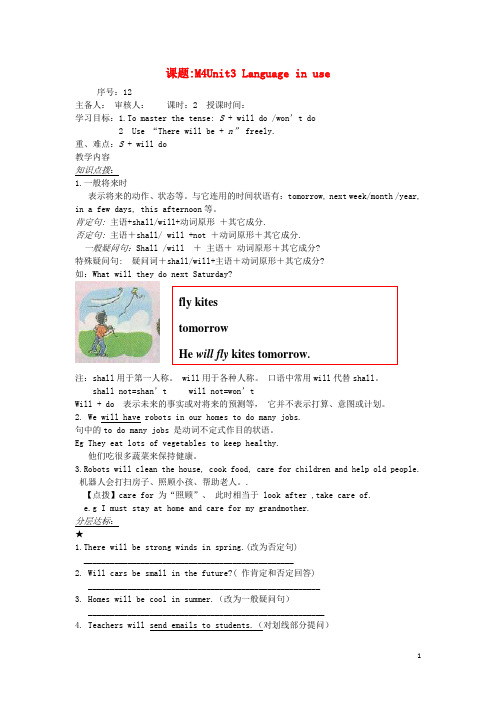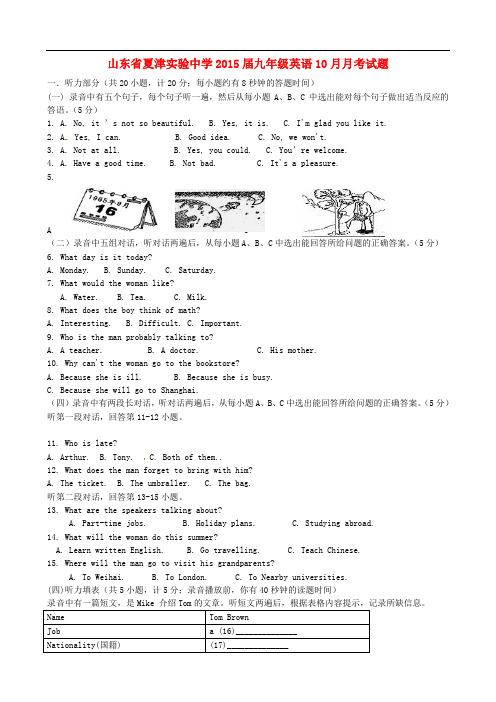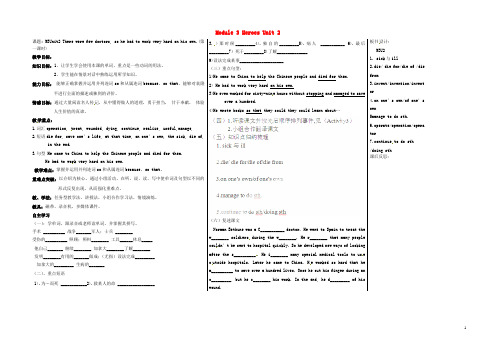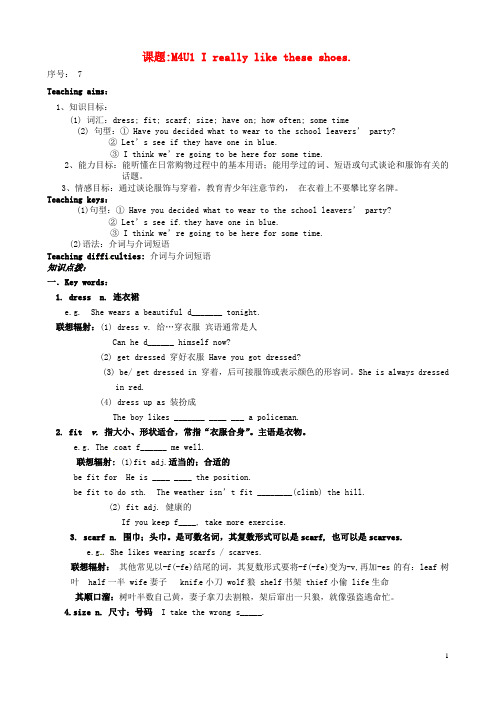山东省德州市夏津实验中学初中英语外研版(新版)九年级下册Module 4 Unit 3 Language in use 学案
山东省德州市夏津实验中学七年级英语下册 M4u3《Language in use》学案(无答案) 外研版

课题:M4Unit3 Language in use序号:12主备人:审核人:课时:2 授课时间:学习目标:1.To master the tense: S+ will do /won’t do2 Use “There will be + n” freely.重、难点:S + will do教学内容知识点拨:1.一般将来时表示将来的动作、状态等。
与它连用的时间状语有:tomorrow, next week/month /year, in a few days, this afternoon等。
肯定句: 主语+shall/will+动词原形+其它成分.否定句: 主语+shall/ will +not +动词原形+其它成分.一般疑问句:Shall /will +主语+动词原形+其它成分?特殊疑问句: 疑问词+shall/will+主语+动词原形+其它成分?如:What will they do next Saturday?fly kitestomorrowHe will fly kites tomorrow.注:shall用于第一人称。
will用于各种人称。
口语中常用will代替shall。
shall not=shan’t will not=won’tWill + do 表示未来的事实或对将来的预测等,它并不表示打算、意图或计划。
2. We will have robots in our homes to do many jobs.句中的to do many jobs 是动词不定式作目的状语。
Eg They eat lots of vegetables to keep healthy.他们吃很多蔬菜来保持健康。
3.Robots will clean the house, cook food, care for children and help old people. 机器人会打扫房子、照顾小孩、帮助老人。
山东省夏津实验中学九年级英语10月月考试题(无答案) 外研版

山东省夏津实验中学2015届九年级英语10月月考试题一.听力部分(共20小题,计20分;每小题约有8秒钟的答题时间)(一) 录音中有五个句子,每个句子听一遍,然后从每小题A、B、C中选出能对每个句子做出适当反应的答语。
(5分)1. A. No, it ’s not so beautiful. B. Yes, it is. C. I'm glad you like it.2. A. Yes, I can. B. Good idea. C. No, we won't.3. A. Not at all. B. Yes, you could. C. You’re welcome.4. A. Have a good time. B. Not bad. C. It's a pleasure.5.A B C(二)录音中五组对话,听对话两遍后,从每小题A、B、C中选出能回答所给问题的正确答案。
(5分)6. What day is it today?A. Monday.B. Sunday.C. Saturday.7. What would the woman like?A. Water.B. Tea.C. Milk.8. What does the boy think of math?A. Interesting.B. Difficult.C. Important.9. Who is the man probably talking to?A. A teacher.B. A doctor.C. His mother.10. Why can't the woman go to the bookstore?A. Because she is ill.B. Because she is busy.C. Because she will go to Shanghai.(四)录音中有两段长对话,听对话两遍后,从每小题A、B、C中选出能回答所给问题的正确答案。
外研版中考英语一轮复习教材梳理课件:九年级下册Module+3-4

15. 光滑的 adj. _s_m_o_o_t_h____→adv. _平__稳__地__;__平__滑__地____
smoothly 16. 笔直的 adj. _s_tr_a_i_g_h_t__ *立即;马上 straight away 17. 突然的 adj. _s_u_d_d_e_n__→adv. 突然地;忽然 _s_u_d_d_e_n_l_y__ 18. 柔软的 adj. _s_o_ft____→adv. 温柔地;柔和地 _s_o_ft_l_y____
主题情景, 知识串练 Sally has diffi_n_g____ things. She
lost her door key again. She __r_e_m_e_m__b_e_r_e_d__ that her husband asked her to remember __t_o_t_a_k_e____(take) the key. She remembered __l_o_c_k_in_g___(lock) the door and then walked to the parking lot. The key may be lost on the way to the parking lot. She had to have a look.
*汽水;软饮料 soft drink 19. 你自己 pron. _y_o_u__rs_e_l_f _→pron. 你的; 你们的 _y_o_u_r__
*独自地; 单独地 by yourself
【名词短语】 1. (M3U1)业余时间;闲暇 __sp_a_r_e__ti_m__e________________ 2. (M4U1)攀岩 __r_o_c_k_c_l_im__b_i_n_g_______________________
山东省德州市夏津实验中学英语九年级英语上册 Module 3 Heroes Unit 2(第1课时)教学案 (新版)外研版

Module 3 Heroes Unit 2课题: M3Unit2 There were few doctors, so he had to work very hard on his own.(第一课时)教学目标:知识目标:1、让学生学会使用本课的单词,重点是一些动词的用法。
2、学生能在情景对话中熟练运用所学知识。
能力目标:能够正确掌握并运用并列连词so和从属连词because,so that,能够对袁隆平进行全面的描述或独到的评价。
情感目标:通过大量阅读名人传记,从中懂得做人的道理,勇于担当,甘于奉献,体验人生价值的真谛。
教学重点:1.词汇operation, treat, wounded, dying, continue, realize, useful,manage,2.短语die for, save one’s life, at that time, on one’s own, the sick, die of,in the end.3.句型 He came to China to help the Chinese people and died for them.He had to work very hard on his own.教学难点:掌握并运用并列连词so和从属连词because,so that。
重难点突破:以介绍为核心,通过小组活动,在听、说、读、写中使单词及句型以不同的形式反复出现,从而强化重难点。
教、学法:任务型教学法,讲授法,小组合作学习法,情境演练。
教具:磁带、录音机、多媒体课件。
自主学习(一):学单词,跟录音或老师读单词,并掌握其拼写。
手术 __________ 战争_______军人;士兵 ________受伤的__________ 照顾;照料________ 工具______休息_____他自己_______ 继续________ 加拿大________了解________发明________有用的_______做成;(尤指)设法完成_________加拿大的_________ 生病的_______(二)、重点短语1).为…而死 ____________2).救某人的命 _________________ 3.)那时候_________4).独自的_________5).病人___________ 6).最后_________7)死于_________8)了解______________9)设法完成某事____________________(三)重点句型:1)He came to China to help the Chinese people and died for them.2) He had to work very hard on his own.3)He even worked for sixty-nin e hours without stopping and managed to saveover a hundred.4)He wrote books so that they could they could learn about…(六)复述课文Norman Bethune was a C___________ doctor. He went to Spain to treat thew________ soldiers during the w________. He r________ that many peoplecouldn’t be sent to hospital quickly. So he developed new ways of lookingafter the s__________. He i________ many special medical tools to us eo utside hospitals. Later he came to China. H e worked so hard that hem__________ to save over a hundred lives. Once he cut his finger during ano_________, but he c________ his work. In the end, he d_________ of hiswound.板书设计:M3U21. sick与ill2.die/ die for/die of /diefrom3.invent/invention/inventor4.on one’s own/of one’sown5manage to do sth.6.operate/operation/operator7.continue to do sth/doing sth课后反思:1。
山东省德州市夏津实验中学九年级英语下册 M4U1 I real

课题:M4U1 I really like these shoes.序号: 7Teaching aims:1、知识目标:(1) 词汇:dress; fit; scarf; size; have on; how often; some time(2) 句型:① Have you decided what to wear to the school leavers’ party?② Let’s see if they have one in blue.③ I think we’re going to be here for some time.2、能力目标:能听懂在日常购物过程中的基本用语;能用学过的词、短语或句式谈论和服饰有关的话题。
3、情感目标:通过谈论服饰与穿着,教育青少年注意节约,在衣着上不要攀比穿名牌。
Teaching keys:(1)句型:① Have you decided what to wear to the school leavers’ party?② Let’s see if they have one in blue.③ I think we’re going to be here for some time.(2)语法:介词与介词短语Teaching diffi culties:介词与介词短语知识点拨:一.Key words:1. dress n. 连衣裙e.g. She wears a beautiful d_______ tonight.联想辐射:(1) dress v. 给…穿衣服宾语通常是人Can he d______ himself now?(2) get dressed 穿好衣服 Have you got dressed?(3) be/ get dressed in 穿着,后可接服饰或表示颜色的形容词。
She is always dressedin red.(4) dress up as 装扮成The boy likes _______ ____ ___ a policeman.2. fit v.指大小、形状适合,常指“衣服合身”。
2024年山东省德州市夏津县第三中学中考二模英语试题(解析版)

2023-2024学年第二学期九年级第二次模拟考试英语试题(满分:150分时间:120分钟)2024. 5一、听力部分(共25小题;1-20小题,每小题1分;21-25小题,每小题2分;共计30分;每小题约有8秒钟的答题时间)(一)录音中有五个句子,每个句子听两遍,然后从每小题A、B、C中选出能对每个句子做出适当反应的答语。
(5分)1. A. Here you are. B. Of course not. C. That's great.2. A. I am thankful. B. Well done. C. Neither do I.3. A. Sorry to hear that. B. You'd better not. C. Come with me.4. A. I agree with you. B. They can read. C. I have finished it.5. A. My pleasure. B. With pleasure. C. Good idea.(二)录音中有三个句子,每个句子对应一幅图片,每个句子听两遍,然后选择与句子内容相对应的图片。
(3分)6. ___________7. ___________8. ___________A B C(三)录音中有五组小对话,听对话两遍后,从每小题A、B、C中选出能回答所给问题的正确答案。
(5分)9. What does Ada want to buy?A. A little ship.B. A toy car.C. A blue dress.10. What's the relationship between the two speakers?A. Mother and son.B. Doctor and patient.C. Classmates.11. Where will Jenny go this weekend?A. To the cinema.B. To another country.C. To the countryside.12. When will they leave for the concert?A. At 8: 00.B. At 7: 50.C. At 7: 30.13. How did Bob feel about his holiday?A. Tired but excited.B. Busy but happy.C. Tired but interested.(四)录音中有一段长对话,听对话两遍后,从每小题A、B、C中选出能回答所给问题的正确答案。
山东省德州市夏津实验中学九年级英语下册 M7U2 Knives and forks are used for most food教案 外研版
课题:M7U2 Knives and forks are used for most food.序号: 14Teaching aims:1、知识目标:(1) 词汇:cheers, cross, over, at the start of, the French, be used for,be filled by, no one, be over(2) 句型: ①When in Rome, do as the Romans do.②Here are some things you may wish to know about eating together in the West.③It isn’t thought to be so important to offer too much food.2、能力目标:阅读短文,了解东西方餐桌礼仪风俗的不同;能写一篇描述一次就餐或聚会的文章,抒发自己的思想感情3、情感目标:学习餐桌礼仪,做一个文明的中学生。
Teaching keys;(1)句型:①A Chinese person eating a Western meal.②Here are some things you may wish to know about eating together in the West.(2)语法:被动语态Teaching difficulties: 被动语态知识点拨:一.Key words:1.cheers int. (用于祝酒)干杯 e.g. Cheers! To your health!【联想辐射】(1)作动词,意为“使高兴;使振奋”cheer up “使……振奋”,代词放中间e.g. He looks sad. Let’s _____ ____ _____.他今天看起来很难过。
我们让他们高兴起来吧。
(2)作名词,意为“欢呼;喝彩”e.g.You can hear the cheers of the crowd because of success.2. cross adj.生气的;恼怒的【常见搭配】(1)be cross with sb.= be angry with sb.生某人的气(2) be cross at sth. 因某事而生气e.g. He ____ ____ ____ ____ us if we don’t finish the work in time.如果我们不及时完成那项工作,他就会生我们的气。
山东夏津外研版必修4第三模块单元测试题
单元检测卷(三)第一部分听力(共两节,满分30分)第一节(共5小题;每小题 1.5分,满分7.5分)听下面5段对话。
每段对话后有一个小题,从题中所给的A、B、C三个选项中选出最佳选项。
听完每段对话后,你都有10秒钟的时间来回答有关小题和阅读下一小题。
每段对话仅读一遍。
1.What is the weather like now?A.Rainy. B.Cloudy. C.Sunny.2.Where will the woman meet Sandy?A.At the post office.B.In the park.C.Downtown.3.When will the speakers probably meet again?A.Before the teachers’ meeting.B.Today after school.C.Tomorrow.4.Which team is the man’s daughter on?A.The swim team.B.The football team.C.The basketball team.5.What are the speakers mainly talking about?A.A history book.B.An evening class.C.The woman’s company.第二节(共15小题;每小题1.5分,共22.5分)听下面5段对话或独白。
每段对话或独白后有几个小题,从题中所给的A、B、C三个选项中选出最佳选项。
听每段对话或独白前,你将有时间阅读各个小题,每小题5秒钟;听完后,各小题将给出5秒钟的作答时间。
每段对话或独白读两遍。
听第6段材料,回答第6、7题。
6.Whose birthday is on Saturday?A.Bill’s.B.Anne’s.C.Mary’s.7.Where will the party be?A.At the woman’s house.B.In a restaurant.C.At a big place outdoors.听第7段材料,回答第8、9题。
山东省德州市夏津实验中学英语九年级英语上册 Module 3 Heroes Unit 2(第1课时)教学案 (新版)外研版
Module 3 Heroes Unit 2课题: M3Unit2 There were few doctors, so he had to work very hard on his own.(第一课时)教学目标:知识目标:1、让学生学会使用本课的单词,重点是一些动词的用法。
2、学生能在情景对话中熟练运用所学知识。
能力目标:能够正确掌握并运用并列连词so和从属连词because,so that,能够对袁隆平进行全面的描述或独到的评价。
情感目标:通过大量阅读名人传记,从中懂得做人的道理,勇于担当,甘于奉献,体验人生价值的真谛。
教学重点:1.词汇operation, treat, wounded, dying, continue, realize, useful,manage,2.短语die for, save one’s life, at that time, on one’s own, the sick, die of,in the end.3.句型 He came to China to help the Chinese people and died for them.He had to work very hard on his own.教学难点:掌握并运用并列连词so和从属连词because,so that。
重难点突破:以介绍为核心,通过小组活动,在听、说、读、写中使单词及句型以不同的形式反复出现,从而强化重难点。
教、学法:任务型教学法,讲授法,小组合作学习法,情境演练。
教具:磁带、录音机、多媒体课件。
自主学习(一):学单词,跟录音或老师读单词,并掌握其拼写。
手术 __________ 战争_______军人;士兵 ________受伤的__________ 照顾;照料________ 工具______休息_____他自己_______ 继续________ 加拿大________了解________发明________有用的_______做成;(尤指)设法完成_________加拿大的_________ 生病的_______(二)、重点短语1).为…而死 ____________2).救某人的命 _________________ 3.)那时候_________4).独自的_________5).病人___________ 6).最后_________7)死于_________8)了解______________9)设法完成某事____________________(三)重点句型:1)He came to China to help the Chinese people and died for them.2) He had to work very hard on his own.3)He even worked for sixty-nin e hours without stopping and managed to saveover a hundred.4)He wrote books so that they could they could learn about…(六)复述课文Norman Bethune was a C___________ doctor. He went to Spain to treat thew________ soldiers during the w________. He r________ that many peoplecouldn’t be sent to hospital quickly. So he developed new ways of lookingafter the s__________. He i________ many special medical tools to us eo utside hospitals. Later he came to China. H e worked so hard that hem__________ to save over a hundred lives. Once he cut his finger during ano_________, but he c________ his work. In the end, he d_________ of hiswound.板书设计:M3U21. sick与ill2.die/ die for/die of /diefrom3.invent/invention/inventor4.on one’s own/of one’sown5manage to do sth.6.operate/operation/operator7.continue to do sth/doing sth课后反思:1。
外研版英语九年级下 Unit 3 Life now and then
new house?
— It’s nice, and it’s _________ than
the old one. (通辽)
A. big
B. bigger
C. biggest D. the biggest
5. Lin Fang comes home _____ than before this term. She doesn’t have so many classes in the afternoon. (重庆) A. early B. earlier C. late D. later
changing (4) _f_a_s_te_s_t_ (fast) of all. Today, with the Internet, people can communicate (5) _m_o_r_e__ea_s_i_ly_ (easily) than ever before with friends all over the world. Not all the changes are (6) _g_o_o_d (good) ones. More people drive cars instead of riding bikes, so they are not as
Read the passage and complete the following sentences.
1. The modern car has changed life a _g_r_e_a_t_ deal.
2. Using horses for travel was _s_lo_w__, and of course walking was even _s_lo_w__e_r_.
2. We do not have much _sp_a_r_e_ time because we have important exams this year.
- 1、下载文档前请自行甄别文档内容的完整性,平台不提供额外的编辑、内容补充、找答案等附加服务。
- 2、"仅部分预览"的文档,不可在线预览部分如存在完整性等问题,可反馈申请退款(可完整预览的文档不适用该条件!)。
- 3、如文档侵犯您的权益,请联系客服反馈,我们会尽快为您处理(人工客服工作时间:9:00-18:30)。
知识点拨-: 一.Companies give their products to film stars, pop stars and sports stars to
wear or use so that fans will buy them in order to copy the stars. 公司把他们的产品给电影明星,流行歌手和体育明星穿或使用以便使追星族为模仿明星而购买这些产品。
(1)so that固定短语, 意为“以便,为的是, 结果”,其后面接从句。例如:
We ran quickly so that we could catch up with him. 我们快跑为的是我们追上了他。 2)in order to固定短语, 意为“为了”,其后面接动词原形。与in order that, so that 同义,只是in order that; so that后面接从句。 如:We started early in order to arrive before dark. = We started early in order that / so that we could arrive before dark.为了在天黑前到达,我们很早就动身了。 【温馨提示】 (1)so…that 和 such…that意思相同, 意为“如此……以至于……”,引导结
果状语从句。但是such 是形容词,修饰名词或名词词组,so是副词,只能修饰形容词或副词。 (2)so…that与be ... enough to do转换;当从句为否定句时,可以与too ... to ... 或be not ... enough to do转换。 ① 杰克病得很严重,结果不得不休息。 Jack is badly ill ____ _____ he has to rest. ② Tony ran very fast in order that he could catch up with others. (改为同义句) Tony ran very fast ____ _____ _____catch up with others ③ He was so fat that he couldn’t get through the door. He was _____ ______ _______ get through the door. 语法苑 介词与介词短语 介词是一种用来表示词与词, 词与句之间的关系的词。在句中不能单独作句子成分。介词后面一般有名词、代词或相当于名词的其他词类、短语或从句作它的宾语。介词和它的宾语构成介词短语,在句中作状语,表语,补语或介词宾语。 一:今天我们来一块学习的介词有about,after,across 等20个介词,下面我们来具体地认识一下: 1.about 关于 Do you know something about Tom? What about this coat?(……怎么样) 2.after 在……之后 I’m going to see you after supper. Tom looked after his sick mother yesterday.(照看) 3.across 横过 Can you swim across the river. 4.against 反对 Are you for or against me? Nothing could make me turn against my country.(背叛)
5.along 沿着
We walked along the river bank. 6.before 在……之前 I hope to get there before seven o’clock. It looks as though it will snow before long.(不久) 7.behind 在……后面 The sun is hidden behind the clouds. 8.by 到……时 We had learned ten English songs by the end of last term. 9.during 在……期间 Where are you going during the holiday. 10.except 除了 Everyone except you answered the question correctly. 11.for 为了 The students are studying hard for the people. 12.from 从 I come from Shanghai. 13.in 在……里 on 在……上面 under在……下面 There are two balls in/on/under the desk.
14、near 在……附近
He writes in black ink.(用……材料) The guard cut one boot open with a knife.(用……工具) She always goes to school by bike.(用……手段) We live near the park. 15.of ……的 Do you know the name of the winner. 16.over 在……正上方 There is a bridge over the river. Tom goes over his English every day.(复习) 17.round/around 围绕 The students stand around the teacher. 18.to 朝……方向 Can you tell me the way to the cinema. 19.towards朝着 The car is traveling towards Beijing. 20.with 和……一起 Would you like to go to the cinema with me? 大家在学习这些介词时可以先记住它的汉语意思,然后参照例句来加深理解,并在今后的学习中加以灵活运用。
二:常用易混介词辨析
1.after/ in 皆可表示时间在……之后,其区别为:after 1)表示“在某点时间之后”,用于将来时。如: We’ll go out for a walk after supper 2)表示“一段时间之后”,用于过去时。如: My mother came home after half an hour. in表示“一段时间之后”,用于将来时。如We’ll go to school in two weeks Taiwan is in the east of China.(台湾属于中国) 2、at/in/on
at seven o’clock(具体某一时刻用at) in April /in April,2002(具体某一月份或年份用in) on April 5,2002/on the morning of Monday(具体某一天用on) 3、in /by /with He writes in black ink.(用……材料) The guard cut one boot open with a knife.(用……工具) She always goes to school by bike.(用……手段) 4、between /among Can you say the differences between the two words?(两者之间) Zhou En-lai lives among the people for ever.(三者或三者以上) 5、besides /except We have seen the crocodile besides Li Fang. (除……之外,还有)全部计算在内 We are all Chinese except Tom in our class. (除……之外)不计算在内 6、on /over/ above There is a boat on the desk(在某物面上,与此物接触。) There is a bridge over the river.(在某物正上方,与此物不接触,或横在某物上,或覆盖在某物上。) She spread a cloth over the table. He held his heads above his head. (“在……上”,强调“高于。”)
7、on/ in / to
Mongolia is on the north of china.(与中国接壤,不属于中国) Japan is to the east of china.(不属于中国,且不接壤) 8、since /for since 表示从过去某一时间以来,后加时间点 for 表示一段时间 I have been living here since 1982.(自1982年以来,我一直住在这里) I have been living here for 20 years.(我已经在这里住了20年了) 9.of /from The desk is made of wood(看得出材料) Paper is made from wood.(看不出材料) The bread is made up of flour, sugar and milk.(由数种成分组成) 10、by /on He used to go to school by bike.(抽象概括) He came to school on this bike yesterday.(具体到哪一辆车) 11、of /for It’s kind of you to come to see me.(既说明不定式本身特点,又说明逻辑主语的品性) It’s important for you students to learn English well.(只说明不定式本身的特征) 12、of /in This is the most interesting of all the stories.(从个体的集体着眼) China has the largest population in the world.(从总体概括着眼) 13、through /past/across The new railway runs through the small town.(穿过) He walked slowly past the tall building.(从旁边经过) Mary walked across the park to do some shopping.(强调从一边到另一边) 14、as /like as 1)用作介词时意思为“作为……,充当”如:
